Welcome to part two of an IFLA! two-part mini series on climate curation and exhibition (you can find the first here). In this second piece, It’s Freezing in LA! Art Editor and Co-Director Nina Carter meets with the Eden Project’s curation team. They discuss their recent exhibition, Acts of Gathering, which explores our changing relationship to food in the context of the climate crisis – and in the process continue our discussion of themes such as the grey area between art and science, community building, and the act of spanning time.
Acts of Gathering at The Eden Project
In October, I visited Acts of Gathering at The Eden Project near St Austell, a show about our shifting relationship with food in a changing world. Acts of Gathering invites us to consider the practice and ceremony of growing, harvesting and sharing food, for us and the land. I connected with the The Eden Project’s curation team, Misha Curson (senior arts curator), Hannah Hooks (arts curator), and Anna Dermitzaki (exhibitions assistant), to learn more about our global food traditions, impacts and changing decisions.
This piece forms the second part of a two part series on climate curation and exhibition. The first documents a conversation with curator Ashish Ghandiali and Head of Creative Programmes at KARST, Ben Borthwick about Against Apartheid, an exhibition showing until the 2nd of December 2023 at KARST in Plymouth. The shows, both situated in the south west of the UK, are both examples of art that explores similar themes – the grey area between art and science, community building, spanning time – and so greatly benefit from being viewed alongside one another.
Just as my previous conversation with Ashish used his words to tell a story of the exhibition, the following story is told from the perspective of the curation team at The Eden Project.
Exhibition and Curation
Acts of Gathering is open until April 2023 at The Eden Project near St Austell. The exhibition features work by Jonathan Baldock, Serge Attukwei Clottey, Jumana Manna, Maria Nepomuceno, Uriel Orlow, and Nina Royle and Lucy Stein. It is curated by Misha Curson and Hannah Hooks.
The exhibition brings together work that celebrates and interrogates food in a rapidly changing world – it invites us to consider the ceremony and symbolism that shape our connections to food, and therefore to each other and to the Earth.
Food has shaped our history, determining the paths we follow and the tools we favour; creating unions and war; changing landscapes and atmosphere. Food can energise us and treat our illnesses, but it can also be a vessel for our beliefs and cultures – a way of sustaining memory and connection. Food carries its own language that can be spoken when people share practices, recipes and knowledge, connecting us to a story that extends beyond time and place
Acts of Gathering explores these ideas and invites people to think about their own connection to them, offering the space to consider what ritual and community mean to them.
The exhibition has a sense of looking at food not just as something we eat but something we practise and celebrate. This is mirrored in the way we move around the exhibition, sit within, and contribute to the work, for example Você Me Alimenta (You Feed Me) is by Maria (Maria Nepomuceno, Acts of Gathering artist).
The curation team really focused on how we move around the space and how we go from something to something else. If we saw Crying the Neck by Nina Royle and Lucy Stein before Corn Dolly by Jonathan Baldock, we see them both in a different way than if we saw them by themselves. It feels like there's an opportunity to have quite individual experiences in the exhibition.
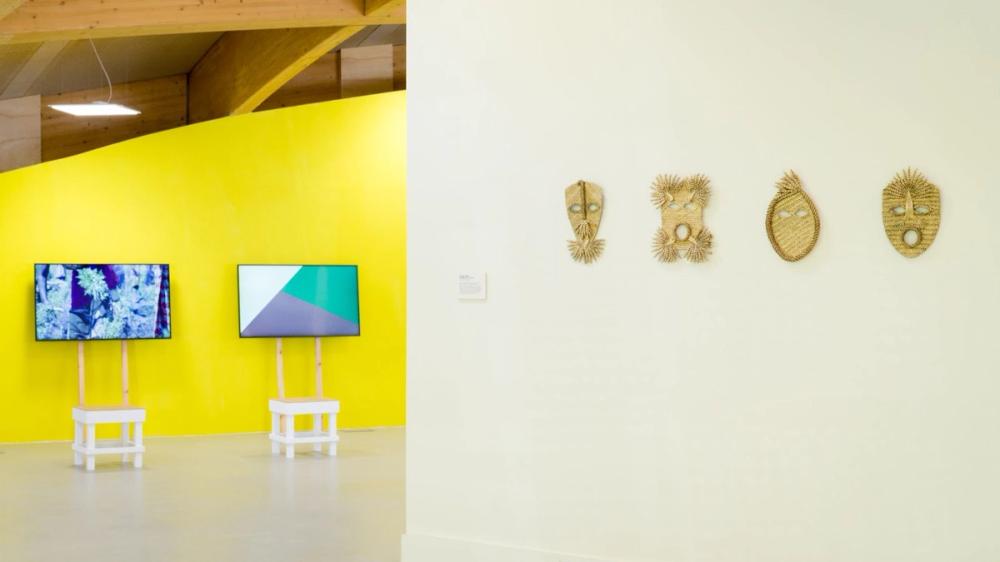
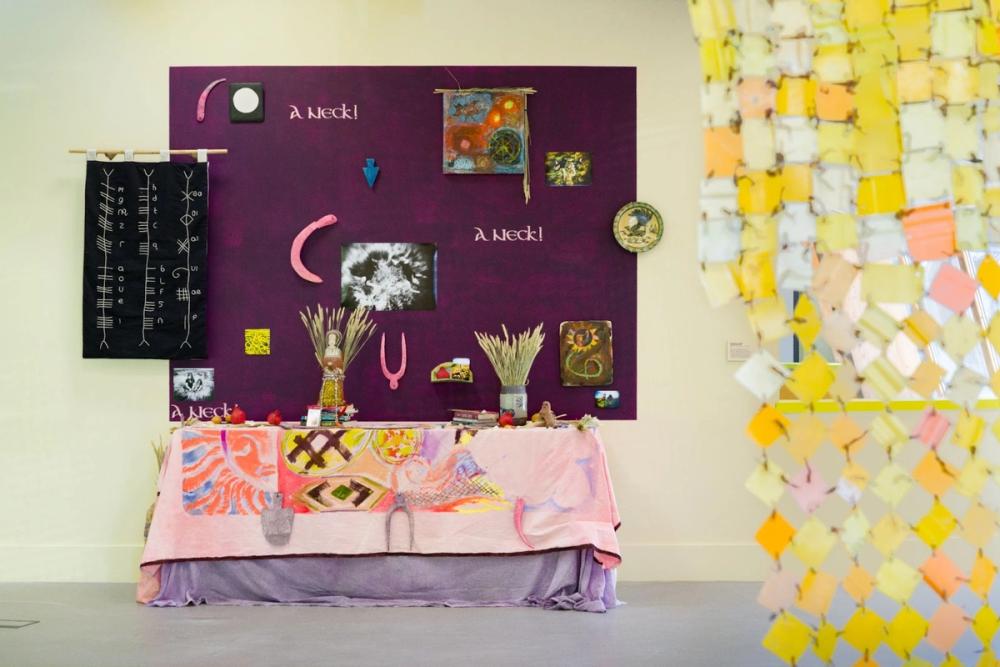
The Community
Visitors to the exhibition contribute to the exhibition – to public discussions about food through panels and talks, and to artworks through workshops and experiences. In the space, we impact the work through this conversation and contribution – we also digest some of the work as we’re invited to drink Artemisia tea when you reach Uriel’s (Uriel Orlow, Acts of Gathering artist) work in the exhibition.
Você Me Alimenta (You Feed Me) is by Maria (Maria Nepomuceno, Acts of Gathering artist) – when it arrived to us in May/June, all the braided straw mouths with tongues were unfed. Throughout the summer, they were fed – this means that the public produced small ceramics to feed the mouths. We've been running clay workshops with visitors with a local ceramicist called Anna Harris, there is a 50p booking fee, so it's fairly accessible. Anna facilitates the workshops, inviting visitors to respond to Maria's work by creating flora and fauna with written messages of their future Earthly hopes and dreams.
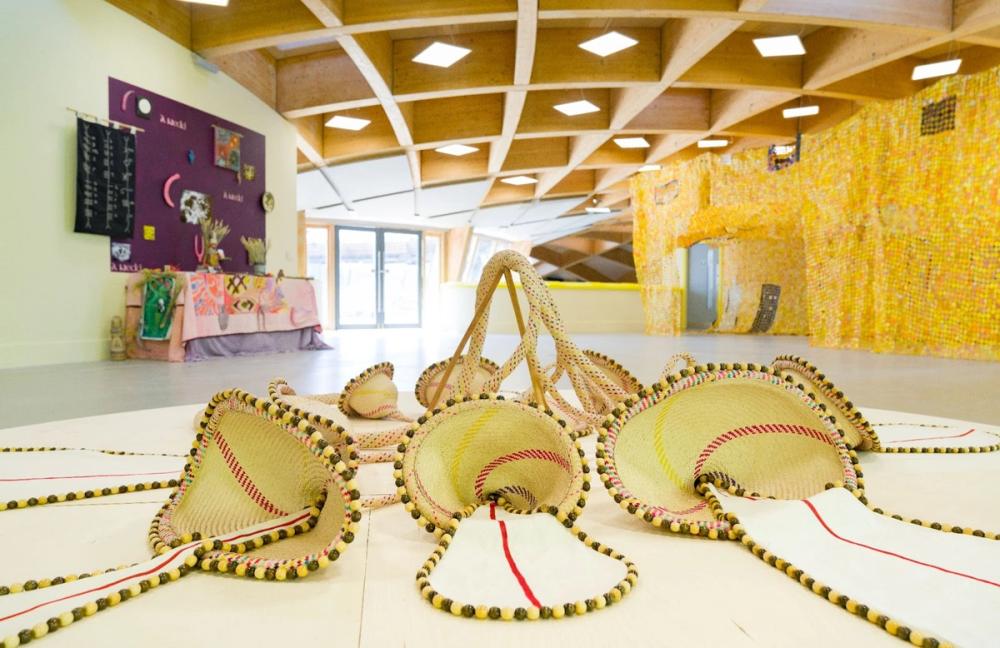
This work, and others in the exhibition, represent our communal ownership of food and land, and how practices of ‘commoning’ are enacted by different communities, often in a way that is simultaneously threatened and resilient. Cooperative growing, foraging, traditional harvesting and new forms of collective eating create community-defined ways of relating to food.
Looking Back; Moving Forward
Globally, our relationship to food is changing rapidly due as climates and so ecologies drastically shift. Acts of Gathering invites us to look at what has gone and what might come; practices that prevail and methods that are no longer available to us, due to colonialism, agricultural issues and a wide range of other climate-related impacts. .
Modern food systems have become more centralised – with 1% of farms operating 70% of farmlands – our access to land has been reduced, particularly for rural women, Indigenous peoples and landless rural communities.
Jumana’s work (Foragers by Jumana Manna, Acts of Gathering artist) explores how agriculture overlaps with law. Her film depicts the practice of foraging for wild edible plants in Palestine and Israel – it’s shot in the Golan Heights, the Galilee and Jerusalem. The film portrays the impact of Israeli nature protection laws on these customs. Restriction laws prohibit the collection of the artichoke-like ’akkoub and za’atar (thyme) and have resulted in fines and trials for hundreds caught collecting these native plants. Whilst Israeli state representatives insist on the need for these laws for environmental protection, they constitute an ecological veil for legislation that alienates Palestinians from their land and their culinary practices.
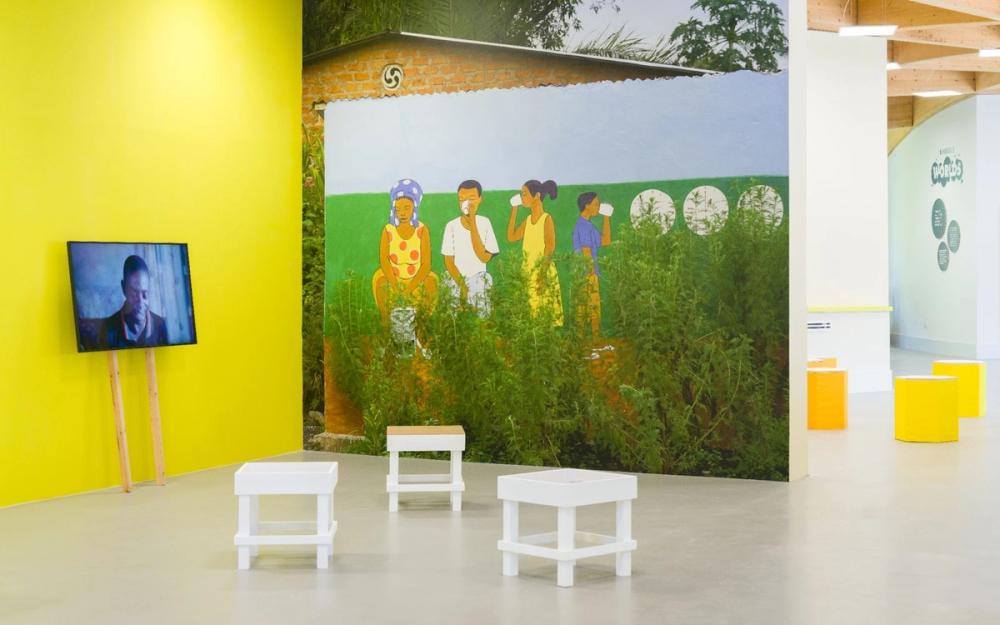
Through industrialised farming practices and increasing land inequality, the customary aspects of food growing, gathering, sharing and eating have been increasingly marginalised. Despite this, different practices surrounding food are still fed by communities that continue to celebrate, forage, eat and grow in ways that are closely tied to, and with respect for, the land.
Throughout our history, communities have governed and collectively tended to the land for food. Movements today sustain and revive this, as in the complementary work for food sovereignty and food commons found in different areas of the world. Food sovereignty can be understood as the ability for a community to define and influence the way they access and interact with food, whilst the food commons is focused on food as a shared resource that is collectively managed through the act of ‘commoning’.
‘Art’ and ‘Science’
In the Core Gallery at The Eden Project, we move through work that is data driven and formats that are archival, fictional and non-fictional. We learn from the work, about personal and intergenerational experiences and possible and literal pasts and futures. Our contribution to the conversation and in some cases work, engages us in this research and knowledge generation.
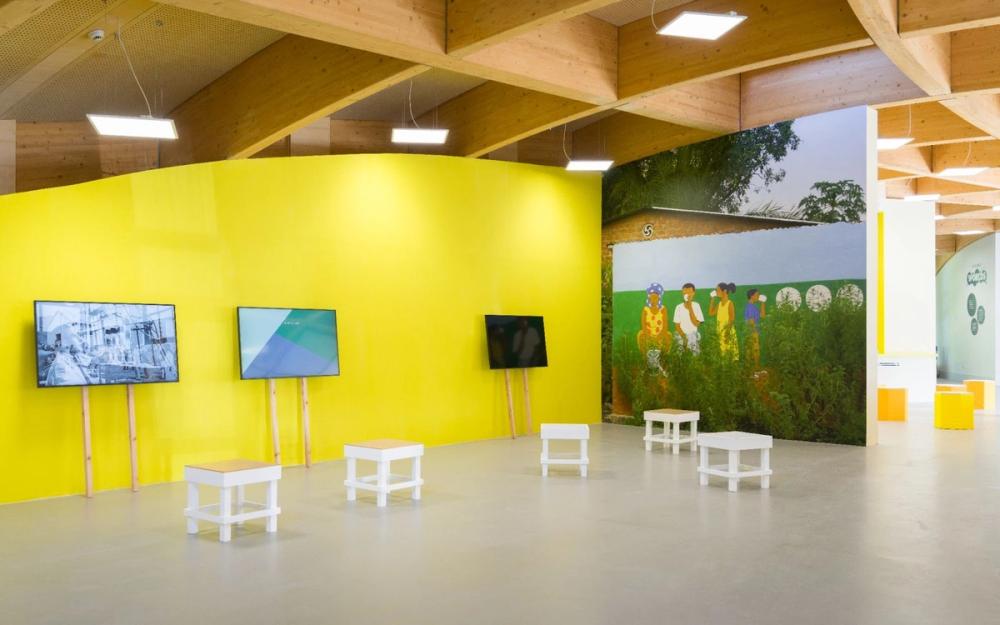
This work by Uriel Orlow, Learning from Artemisia, explores legacies of colonialism and ideas of memory in ecological justice. Learning from Artemisia is about a traditional medicinal plant called Artemisia afra, which, taken as an infusion, is used to prevent and treat malaria.
Uriel’s film captures women he worked with at a women’s cooperative in Lumata, south of Lubumbashi, that grow Artemisia afra – the proceeds from their work are funding collective health insurance for them and their families. You are offered Artemisia tea when you reach Uriel’s work in the exhibition – the Artemisia afra is grown in the back garden at The Eden Project. We are shown the science and told the story through the consumption of the tea – it’s research-based.
Materials, Objects and Methods
The Eden Project curation team selected work of sculpture, installation, film and performance to be shown in Acts of Gathering – they tell us about the perspective of the maker by employing materials (or subjects) that map the work to a particular place.
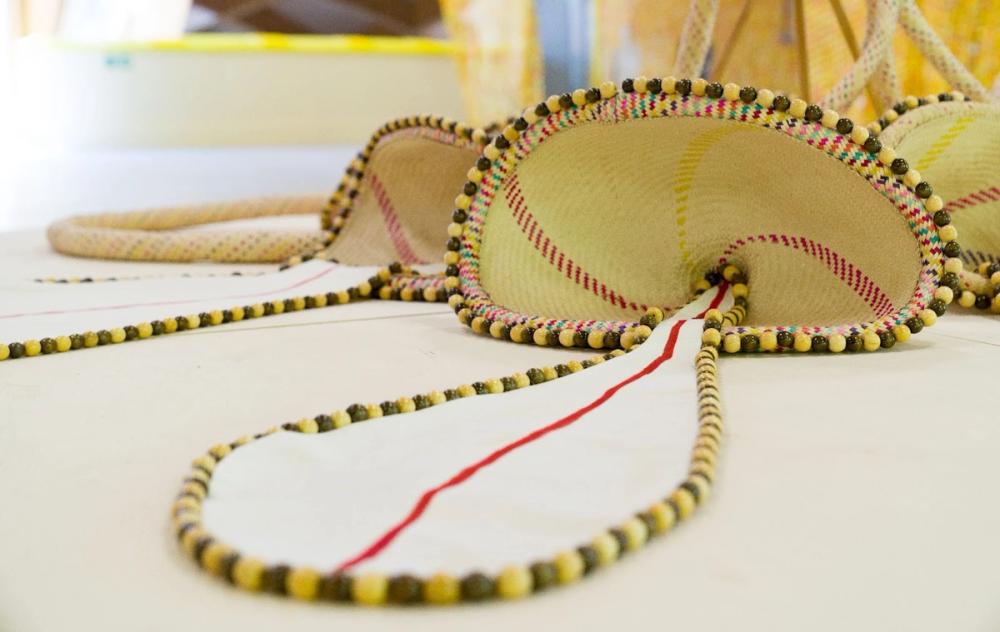
Maria (Maria Nepomuceno, Acts of Gathering artist) used braided straw from the carnauba tree to build the ‘mouths’ in Você Me Alimenta (You Feed Me) – carnauba is a palm that grows in the dry area of Brazil known as the sertão in Cearà. She works in circles, we can't see a start or an end – there’s the idea that what we put in is what comes out. At Eden, we’re in a China clay quarry, so the link to clay native to Maria’s work and home in Rio is important, she’s brought herself to the space.
And then we have Serge (Serge Attukwei Clottey, Acts of Gathering artist) who is a Ghanaian artist and Noko Y3 Dzen (Something in the world) uses lots of little pieces of plastic made into a tapestry. They’re all made from jerry cans, which are initially used as cooking oil canisters and then recycled to collect water or fuel. After a while, they erode but they can't break down and are often dumped. Serge explores this personal and political narrative, which is rooted in histories of trade, food and migration.
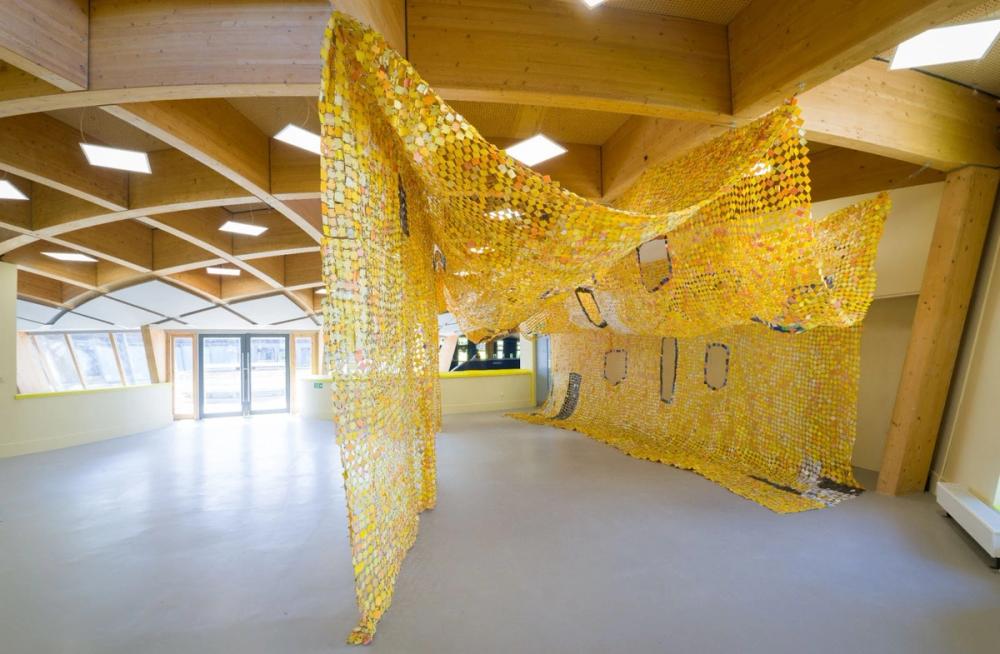
Time and Boundaries
Tea grown in the Eden back garden has been brewed and drunk, work has been developed during exhibition, and historical atrocities and practices have been reflected upon – temporality grounds much of the work at hand. Ultimately, as an organisation and space that centres ecology and growth – including food production – the questions and speculations that arose during Acts of Gathering will continue to permeate both their work, and our visits.
The work exists right now, but it has started a conversation that will kind of continue after the exhibition closes. Maria’s (Maria Nepomuceno, Acts of Gathering artist) work, for example, has changed and will keep changing through the show – it has a bit of a changing legacy.
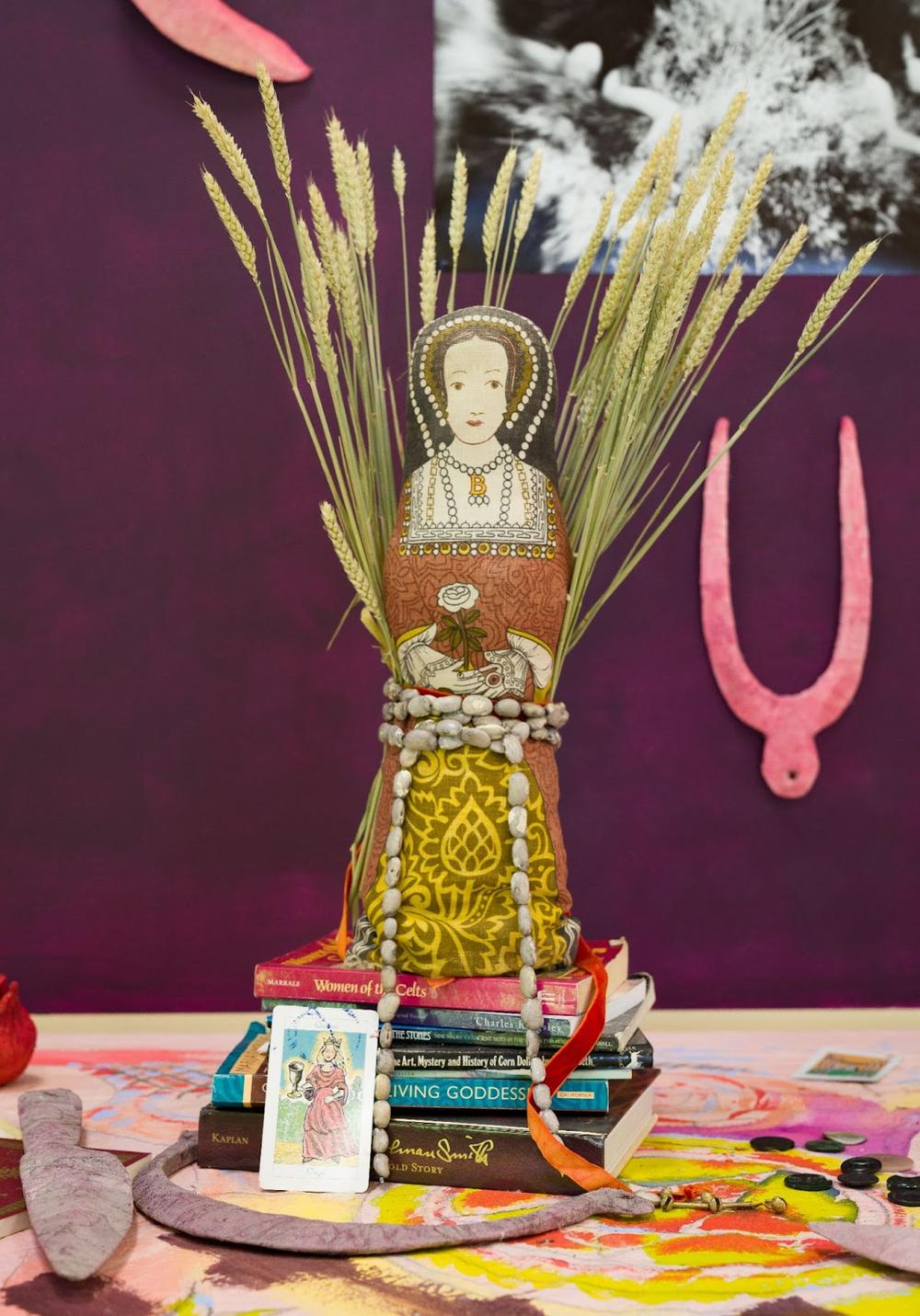
Some of the work was created for specific seasons, Crying the Neck by Nina and Lucy (Nina Royle and Lucy Stein, Acts of Gathering artist) was originally made for the winter solstice so they revisited the work when installing, in the May – colours have changed, for example. It’s kind of pieced together responding to the season around it – it’s interesting to consider what it will feel like in December.
More Reads
Welcome to part one of an IFLA! two-part mini series on climate curation and exhibition. In this first piece, It’s Freezing in LA! Art Editor and Co-Director Nina Carter meets with Ashish Ghadiali and Ben Borthwick to discuss Against Apartheid, a Plymouth based exhibition, organised by Radical Ecology, run by Ghadiali to discuss themes including the grey area between art and science, community building, and the act of spanning time.
Keep reading >
Art
Climate and Exhibition: Against Apartheid at KARST
By Nina Carter(Interview)Art
Climate and Exhibition: Against Apartheid at KARST
Keep readingWelcome to part one of an IFLA! two-part mini series on climate curation and exhibition. In this first piece, It’s Freezing in LA! Art Editor and Co-Director Nina Carter meets with Ashish Ghadiali and Ben Borthwick to discuss Against Apartheid, a Plymouth based exhibition, organised by Radical Ecology, run by Ghadiali to discuss themes including the grey area between art and science, community building, and the act of spanning time.
By Nina CarterKeep readingArt
Review: Klima Biennale Wien
Keep readingIt's Freezing in LA! art editor and co-director Nina Carter reviews the first ever Klima Biennale Wien and finds refreshing storytelling, artist activist events and fictional speculations.
By Nina CarterKeep readingIf such a position existed, Olafur Eliasson might well be appointed as the Earth’s resident artist. Growing up in rural Iceland in the early 70s, his work is profoundly influenced by the natural phenomena and landscapes of his homeland. In this legacy piece, from Issue 4, Kiddy Grady interviews Eliasson, exploring the thought behind large-scale, immersive installations, and their attempts to reconnect us to nature: Waterfalls (2008) features artificial cascades in New York’s Hudson River; Moss Wall (1994) covers a giant canvas in delicate white lichen and Green River (1998) dyes waterways bright green. His work has been described as a kind of smoke and mirrors ‘technological sublime’ that invokes the spirit of the Romantics.
Keep reading >
Art
An Interview with Olafur Eliasson
By Kitty GradyArt
An Interview with Olafur Eliasson
Keep readingIf such a position existed, Olafur Eliasson might well be appointed as the Earth’s resident artist. Growing up in rural Iceland in the early 70s, his work is profoundly influenced by the natural phenomena and landscapes of his homeland. In this legacy piece, from Issue 4, Kiddy Grady interviews Eliasson, exploring the thought behind large-scale, immersive installations, and their attempts to reconnect us to nature: Waterfalls (2008) features artificial cascades in New York’s Hudson River; Moss Wall (1994) covers a giant canvas in delicate white lichen and Green River (1998) dyes waterways bright green. His work has been described as a kind of smoke and mirrors ‘technological sublime’ that invokes the spirit of the Romantics.
By Kitty GradyKeep reading- Read more